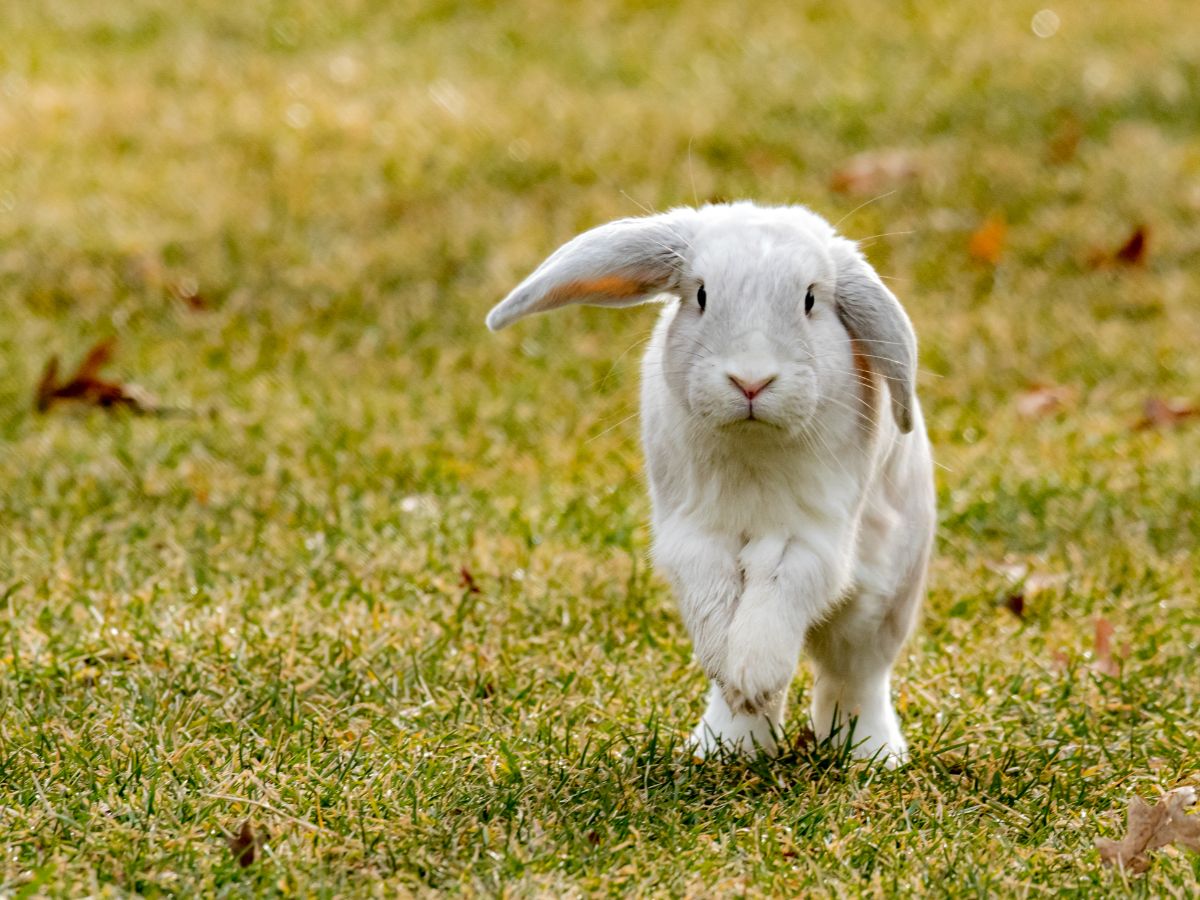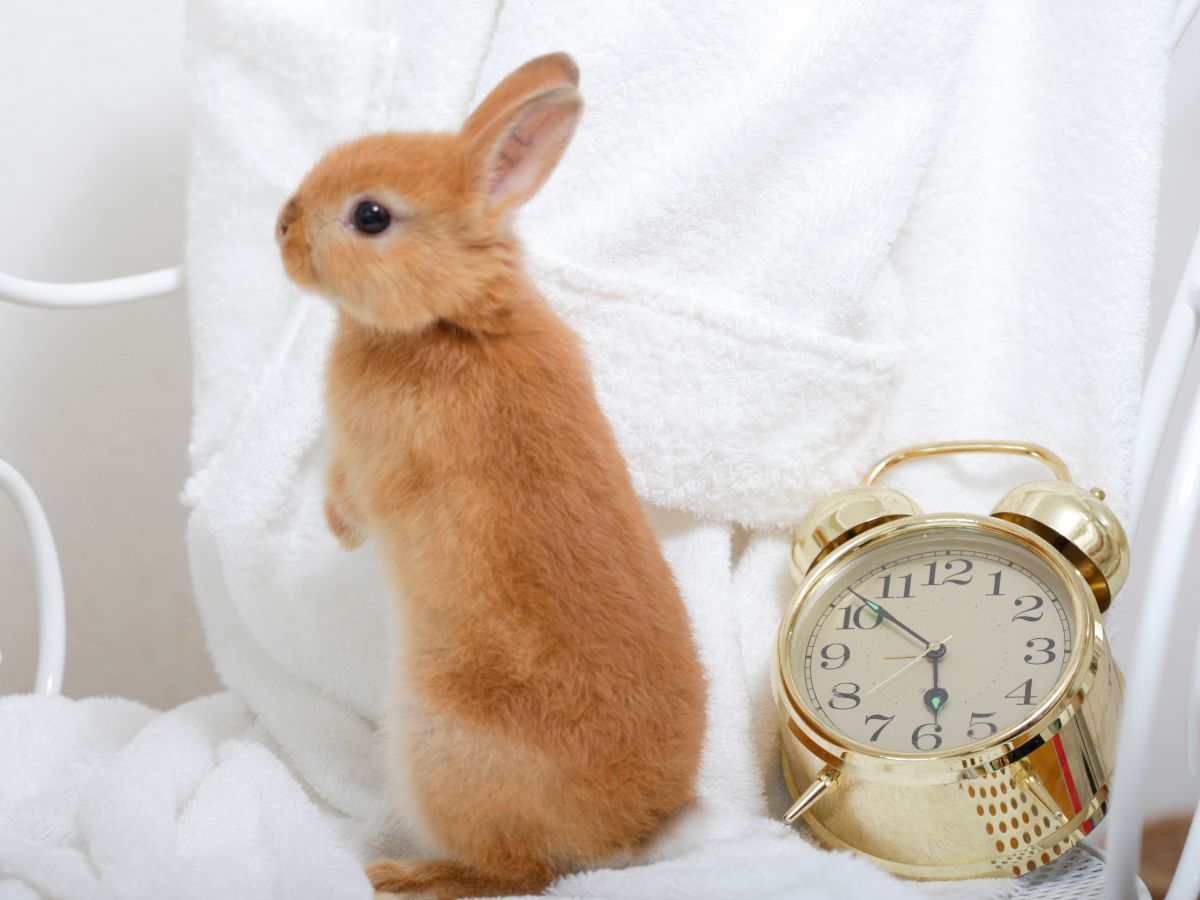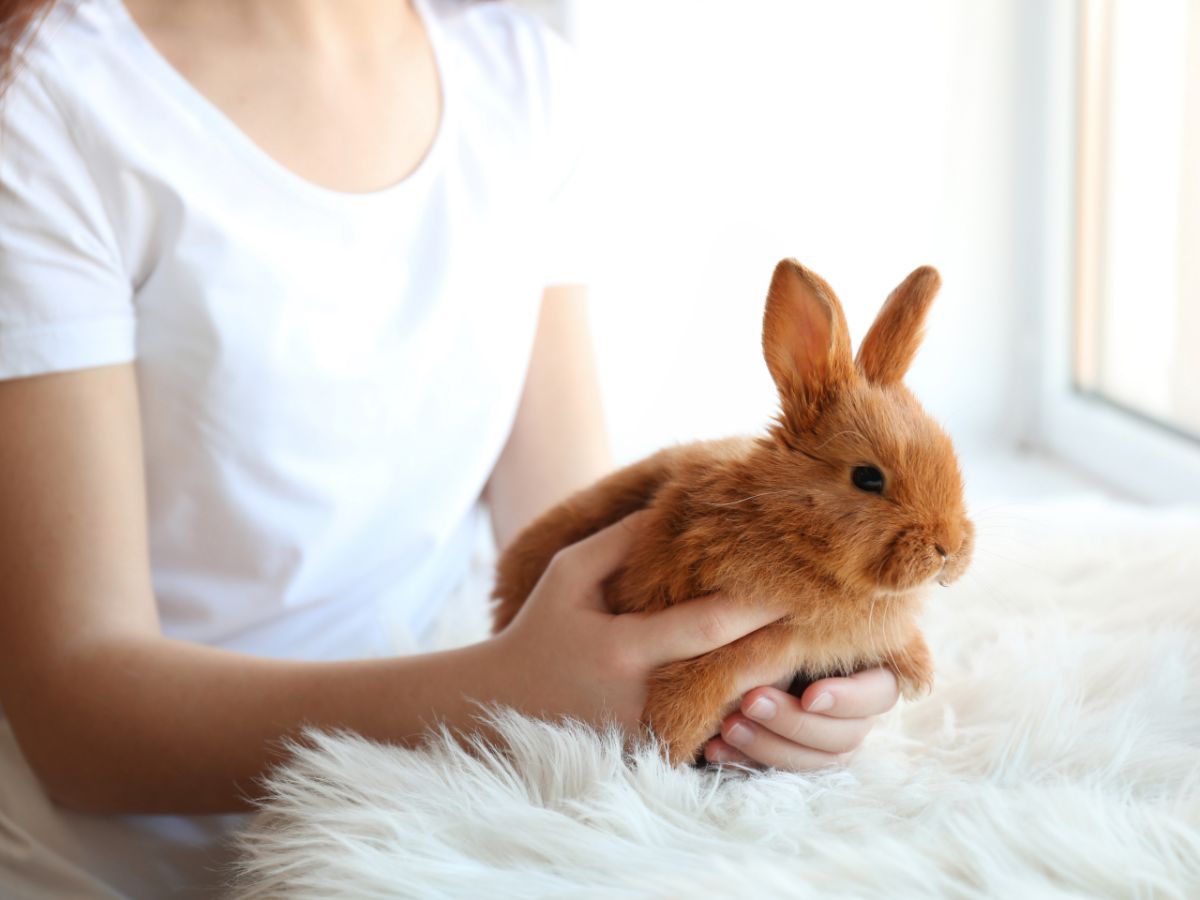Rabbits are notoriously anxious animals because they are prey to several different predators. They are always alert and wary of their environment lest a falcon, fox, or bobcat has them for lunch! So, gaining their trust will mean making sure that they feel safe.
It will take a few months to gain your rabbits’ trust. Avoid picking up your rabbit at first or forcing her to cuddle with you. Instead, give your rabbit space to approach you and reward her with treats. Get down onto your bunnies’ level and have regular playtime together.
Making friends with your pet rabbit will mean that you try to see the world through their eyes. Let’s explore which approaches work best when attempting to bond with your favorite fluff ball.
Contents
Basic Rules For Gaining Your Rabbit’s Trust
Just like every friendship, your bunny will need to recognize that you are safe to be around and start to enjoy your presence. Adhering to some basic rules of engagement will go a long way to establishing a solid foundation for your relationship.
Avoid Picking Up Your Rabbit At First
You may be overwhelmed by the desire to pick up your rabbit and give her constant snuggles when you first bring her home. You may suffer from severe cuteness overload, but it’s important to restrain yourself.
You need to understand that it is a terrifying experience for a rabbit to be lifted off the ground, as they are preyed on by falcons, eagles, and owls. Rabbits live in burrows for a reason; it provides safety from being lifted off the ground and ending up as a snack for a bird of prey.
Regularly picking up your rabbit for a snuggle should be strictly avoided at first, as your rabbit needs to recognize this experience as safe, non-threatening behavior. Start your friendship by getting on to the same level as your bunny.
Lower Your Voice To Gain Your Rabbits Trust
Rabbits rely on their hearing to identify threatening sounds, so when you start a conversation with your new pet, keep your voice calm, pleasant, and muted. Any aggressive, loud noises you make may make your rabbit feel anxious and threatened.
Giving your new pet rabbit enough space to feel safe in its environment will make it easier for them to provide you with the gift of their trust and friendship. Allow your new pet the opportunity to approach you first instead of constantly reaching for her.
Get Down To Your Rabbits’ Level
Animals are naturally curious, so being calm, quiet, and non-threatening by coming down to their level encourages them to come over to sniff and nibble you. Eventually, they will identify you as safe, which is the first step to establishing a friendship.
Instead of bending over your rabbit, crouch down, or lie flat on your back so your fluffy friend can see your friendly face, not just your feet.
Sticking to these basic guidelines should start to put your rabbit at ease and is the building block for getting closer to your rabbit. Once your rabbit is comfortable, you can start to introduce some new activities into your routine
Use Treats To Build Trust With Your Rabbit
Getting your rabbit to associate you with happy things is a great way to establish a bond. As you spend time with your bunny, reward her with little treats whenever she approaches you.
You can experiment with different treats and use this as an opportunity to learn which treats your rabbit responds to best. It may be fun to figure out your bunnies’ taste preferences.
Apples, carrot tops, dandelions, grapes, blueberries, and bananas are great treats to feed your rabbit. Allow your rabbit to eat out of your hand; as she gets used to this, you can reach out and gently stroke her head.
Learn How To Read Your Rabbits Body Language
As you spend time with your bunny, take the time to understand her body language. Rabbits may not be as vocal as a dog or cat, but they convey different messages with their body language.
Take note of the ears and eyes especially. A fearful rabbit will press her body close to the ground with her ears pressed close to her body and widened eyes. Do not overwhelm a frightened rabbit by picking her up. Instead, give her some space and time in her hatch.
The trick to gaining a rabbit’s trust is not to force her into anything before she is ready. A shy rabbit may start to come out of her shell sooner if you simply give her space initially.
A more confident, happy rabbit might jump around freely or relax in the “loaf” position where her feet are neatly tucked under her body with her ears lying flat against her back. Once your rabbit displays a more relaxed, happy demeanor, you can proceed to the next step. Stroking your rabbit or gently picking her up must only happen when she is ready.
Create Playtime With Your Rabbit
In their natural setting, a rabbit will hang out with friends and family grooming each other, going on adventures together, cuddling, and enjoying ample playtime. You can be a good friend to your bunny by recreating these experiences with her.
Start by introducing some toys into your play sessions. Don’t spend lots of money on toys as simple objects such as wicker baskets, toilet paper rolls, or rubber balls make excellent playthings.
You can invest in proper toys as you get to know what your rabbit seems to enjoy playing with. Rabbits need roughly one to two hours of exercise and play a day; during this time, let her out of her hatch to roam freely around the house to get in a good dash and burn off some energy!
Ensure that your children and other household members are aware that your rabbit is out for playtime and keep other pets like cats or dogs securely in another part of the house at first.
Rabbits have a very different sleep cycle from humans and will be most active after sunset and sunrise. Never wake up your sleeping rabbit and force it to play with you, as this may alarm your new pet.

How Long Will It Take To Gain Your Rabbits Trust?
Gaining your pet rabbits’ trust will require patience, and the amount of time it takes to bond largely depends on your rabbit’s personality and her personal history. Generally, with persistent effort, it will take a few months to create a bond on which to establish a relationship with your fur baby.
Research has shown that when a bunny has been handled from a young age, they tend to form bonds with their owners more quickly. If your bunny is used to being picked up at a young age, it will be more comfortable with you handling her.
Just like people, rabbits have unique personality traits and tendencies. Your rabbit may be naturally trusting and curious, craving interaction from you. But many bunny parents find that their bunny is bashful and nervous, and scares very easily.
Naturally, you can expect that it will take a while longer to gain the trust of a shy, nervous rabbit. Luckily, there are a few proven steps that you can follow to ensure that your rabbit feels confident enough to get close to you.
How To Know That Your Rabbit Trusts You
Certain signs indicate that you are succeeding in gaining your rabbit’s trust. By taking note of the changes in her body language, you can gauge how comfortable she is. It may be evident that you have her trust by how she acts around you.
Your bunny will become a lot more relaxed and approach you with confidence. Getting up onto the couch to sit on your lap shows that she feels safe and secure with you and wants your company.
Rabbits display some adorable, animated behaviors once they have bonded with you. You may notice that your rabbit may start to lick you, this is a sign of affection, and you should feel flattered.
Flopping down right in front of you, nudging you with her nose, or “jumping for joy” while you’re playing are all signs that she is feeling secure and happy. You may also notice that your fluffball can be rather vocal when she is happy, making noises that sound like purring, oinking, and sighing (all sorts of adorable!)
Conclusion
Gaining your rabbit’s trust and affection is rewarding as it sets the tone for your friendship. Being quiet, approaching her on her level, giving your rabbit space, making time for play, and rewarding her with snacks will all contribute to gaining her trust.




